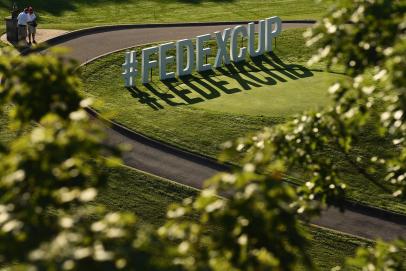The PGA Tour’s fall slate begins this week with the Fortinet Championship. However, for the first time in a decade, the autumn series does not signal the start of the tour’s regular season. And that will be far from the only change fans will see over the following months.
Re-engineered as “The FedEx Cup Fall,” this part of the tour’s calendar is essentially its own campaign, and though this time of the year is historically golf’s sleepy stretch, it now actually has more significance. Here are nine questions and answers you need to know about the new fall season:
So the wrap-around season is done?
Yes. In 2013, the PGA Tour began its new “season” in the fall, with the tour year stretching two calendar years. But this April the tour announced its next season would start at the 2024 Sentry (formerly the Tournament of Champions) during the first week of January. The top 70 players off the 2023 FedEx Cup points list at the end of the regular season qualified for the 2023 playoffs (which concluded at the Tour Championship) and guaranteed their full playing status for 2024. The 50 players who reached the second playoff event at the BMW Championship are also exempt into 2024’s "signature" events, a series of eight tournaments with limited fields, no cuts and $20 million prize money payouts.
What’s on the line then?
Players who failed to qualify for the playoffs will now have to play in the FedEx Cup Fall to retain or regain their playing status for 2024. All FedEx Cup points from the 2022-’23 PGA Tour season carry over to the fall, with those inside the top 125 at the end of the fall earning full status for next season.
Additionally, the top 10 players on the points list at the end of the fall who are not already qualified for the 2024 signature events will earn a spot into the first two following the Sentry, which will be the AT&T Pebble Beach Pro-Am and the Genesis Invitational. Though players who finished 51st to 70th on the FedEx Cup points list have already earned their status next season, they can use the fall series to snag the signature event spots.
The points earned in the fall, however, will not carry over to the 2024 FedEx Cup list.
Does winning a fall event still deliver the same perks?
Mostly. Though points don’t transfer over to the next calendar season, winners of fall events will continue to receive a two-year tour exemption and invites to the Masters, PGA Championship, the Players Championship and the Sentry. The seven fall events also offer a collective $56 million in prize money.
Can top 50 players still compete?
Yes. Though they will not be awarded any FedEx Cup points, those in the top 50 can play in the fall. For example, the Fortinet Championship’s field has five top 50 players: Sahith Theegala, Andrew Putnam, Eric Cole, Brendon Todd and two-time defending Fortinet champ Max Homa. Aside from trying to stay sharp, the top-50 crew can still win prize money and accrue Official World Golf Ranking points.

Richard Heathcote
Who are some of the higher-profile players we’ll likely see?
Justin Thomas, who was the first man out of the playoffs (No. 71), is scheduled to play in the Fortinet before heading over to the Ryder Cup in Rome. Will Zalatoris also could make a few starts in the fall as he returns from a back issue. Rising star Akshay Bhatia secured his 2024 card by winning the Barracuda Championship but didn’t make the postseason due to an odd membership ruling, so don’t be surprised if he competes through the fall to earn his way into the signature events. Other notable players you may see this fall include Webb Simpson, Kevin Kisner, Joel Dahmen, Adam Scott and Billy Horschel.
What about Korn Ferry Tour players?
Fall fields have historically been filled by those who just earned their memberships off the tour’s developmental circuit. However, past Korn Ferry Tour Finals have ended before the new PGA Tour season began; the 2023 KFT Finals don’t end until Oct. 8. Those who finish in the KFT top 30 will earn full PGA Tour status in 2024.
Has the schedule changed?
Slightly. Last year’s fall calendar had 10 events, nine of which were played (the WGC-HSBC Champions was canceled due to COVID-19 restrictions for the third straight year). This year’s fall slate has seven events, with the following dates:
Sept 11-17: Fortinet Championship, Silverado Resort, Napa, Calif.
Oct 2-8: Sanderson Farms Championship, C.C. of Jackson, Jackson, Miss.
Oct 9-15: Shriners Children’s Open, TPC Summerlin, Las Vegas
Oct 16-22: Zozo Championship, Accordia Golf Narashino, Chiba, Japan
Oct 30-Nov 5: World Wide Technology Championship, El Cardonal, Los Cabos, Mexico
Nov 6-12: Butterfield Bermuda Championship, Port Royal, Southampton, Bermuda
Nov 13-19: RSM Classic, Sea Island Golf Club, St. Simons Island, Ga.
The WGC-HSBC is no longer on the tour schedule; given the WGC-Dell Match Play also is not returning—coupled with the advent of the signature-event series—it is likely the HSBC Champions will no longer be held, at least in its previous configuration. Another notable change is the Houston Open, which was held the past few seasons in the fall but has now been moved to the spring. Also missing from past fall schedules is the CJ Cup, which has now been fused with the former Byron Nelson event.
What happens to those that don’t finish inside the top 125 at the end of the fall?
A similar fate to missing the playoffs in previous seasons. Those ranked 126th to 150th will have conditional status on tour, which will still confer a number of starts during the season. Additionally, those outside the top 125 can still earn or improve their status through the PGA Tour’s Q-School presented by Korn Ferry, which returns for the first time since 2012. The top five finishers and ties from the final stage of Q School will be exempt for the 2024 season.
Is the tour’s 2023 "season" officially over after the RSM Classic?
No. Following a trip to Sea Island the tour will then conduct its “challenge” season, which are exhibitions at the Hero World Challenge, the Grant Thornton Invitational and the PNC Championship. However, results in these events do not offer the same benefits as regular or fall season events.





